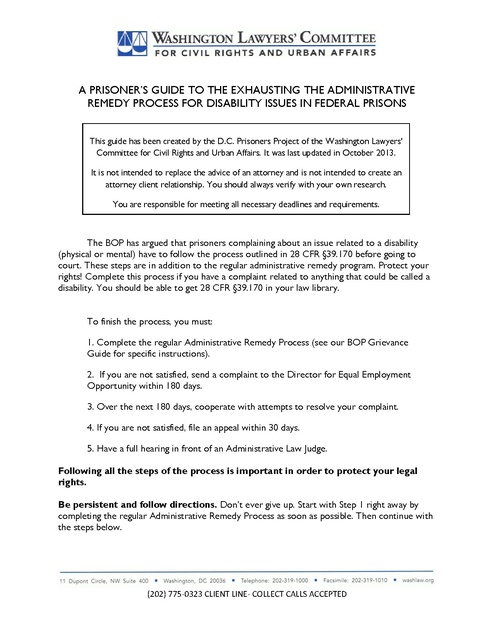Grievance Guide for Disability Issues in Federal Prisons, Washington Lawyer's Committee, 2013
Download original document:

Document text

Document text
This text is machine-read, and may contain errors. Check the original document to verify accuracy.
A PRISONER’S GUIDE TO THE EXHAUSTING THE ADMINISTRATIVE REMEDY PROCESS FOR DISABILITY ISSUES IN FEDERAL PRISONS This guide has been created by the D.C. Prisoners Project of the Washington Lawyers' Committee for Civil Rights and Urban Affairs. It was last updated in October 2013. It is not intended to replace the advice of an attorney and is not intended to create an attorney client relationship. You should always verify with your own research. You are responsible for meeting all necessary deadlines and requirements. The BOP has argued that prisoners complaining about an issue related to a disability (physical or mental) have to follow the process outlined in 28 CFR §39.170 before going to court. These steps are in addition to the regular administrative remedy program. Protect your rights! Complete this process if you have a complaint related to anything that could be called a disability. You should be able to get 28 CFR §39.170 in your law library. To finish the process, you must: 1. Complete the regular Administrative Remedy Process (see our BOP Grievance Guide for specific instructions). 2. If you are not satisfied, send a complaint to the Director for Equal Employment Opportunity within 180 days. 3. Over the next 180 days, cooperate with attempts to resolve your complaint. 4. If you are not satisfied, file an appeal within 30 days. 5. Have a full hearing in front of an Administrative Law Judge. Following all the steps of the process is important in order to protect your legal rights. Be persistent and follow directions. Don’t ever give up. Start with Step 1 right away by completing the regular Administrative Remedy Process as soon as possible. Then continue with the steps below. (202) 775-0323 CLIENT LINE- COLLECT CALLS ACCEPTED OVERVIEW OF THE EXTRA EXHAUSTION STEPS FOR DISABILITY ISSUES AT FEDERAL PRISONS Step 1: Complete the regular Administrative Remedy process • Always go through the regular Administrative Remedy process: • BP-8 (Informal Resolution) • BP-9 (Administrative Remedy Request • BP-10 (Regional Appeal), and • BP-11 (Final Appeal to the BOP Central Office) • See our BOP Grievance Guide for more instructions • If you are not satisfied, move on to Step 2 within 180 days of end of the process Step 2: Send a Complaint to the Director of Equal Opportunity Employment • Within 180 days, send a complaint to this address: Director of Equal Employment Opportunity U.S. Department of Justice 10th and Pennsylvania Avenue, NW Room 1232 Washington, D.C. 20530 Step 3: Cooperate with attempts to resolve your complaint • Over the next 180 days,You may be asked questions by an investigator or lawyer for the BOP. You must cooperate. • You may be asked to compromise parts of your request. Be reasonable. • If you and the BOP do not come to an agreement, you will get an official "Letter of Findings" in response to your complaint. If you are not satisfied, move on to Step 4 Step 4: File an Appeal • Within 30 days, write letter saying why you think the "Letter of Findings" is wrong.You should also say if you want a full hearing or if you want the issue decided just based on the paperwork. • Send your appeal to this address: Director of Equal Employment Opportunity U.S. Department of Justice 10th and Pennsylvania Avenue, NW Room 1232 Washington, D.C. 20530 Step 5: Have a full hearing before an administrative law judge • If you asked for a hearing, the hearing will be conducted according to 5 U.S.C. 554-557 (sections 5-8 of the Administrative Procedure Act). This will be like a trial, but less formal. • If you get to this point, please contact the D.C. Prisoners' Project to see if we are able to help you. We cannot promise that we will, but we will look at your situation carefully. • WIthin 30 days, you will get a decision from the administrative law judge. Step 6: File a final appeal • Within 15 days, file any "exceptions" you have to the decision. Exceptions are basically a letter listing everything you think is wrong with the administrative law judge's deicsion. • If the BOP files exceptions, you have 10 days to write a letter explaining why you disagree. • You should get a decision within 60 days. You are now finished with the exhaustion process. If your problem is not fixed, you may now consider if you want to file a lawsuit.

